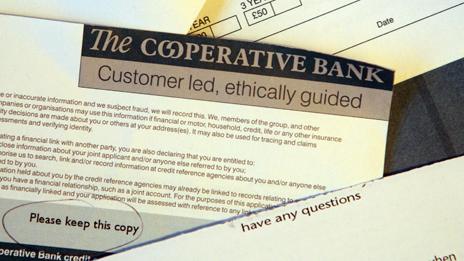Can Co-op Bank rise from the ashes?
- Published
- comments

It is a humiliating day for Co-op Group, or at least its previous management, because there is confirmation in today's rescue deal for Co-op Bank that the value of the bank has collapsed to nothing.
One reason why this bank should stay afloat is because Co-op Group is injecting £462m into it. But even so, Co-op Group will emerge with a holding in the bank of just 30%. Or to put it another way, the value of its current 100% ownership of the bank is being valued at a big fat zilch.
This destruction of Co-op Group's investment in the bank stems from a merger with Britannia Building Society in 2009 that has spewed losses, massive wasted investment in IT and from not generating enough profit out of the better operations to meet regulators' requirements for the capital it needs as a buffer against potential future losses.
If the rescue happens, the remaining 70% of Co-op Bank will henceforth be held by hedge funds and other investors.
Their £942m of loans to the group - or more precisely, their holdings of bonds classified as "lower tier 2 capital" under the Basel classification (stay with me!) are being converted into shares. And they are also putting £125m of cash into the bank.
Oh my goodness, hedge funds in charge of the UK's most ethical bank! Whatever next?
Well the hedgies - led by Aurelius, Silver Point and Monarch - insist they are not on a mission to turn Co-op Bank into just any old bank, or worse - unless, that is, any old bank wouldn't spill red ink on the scale of the Co-op in recent years (err yes, any old bank has done that too).
The important point is that the professional investors don't want to lose any or all of Co-op Bank's staggeringly loyal 4.7 million customers, who have stuck with the group through all the uncertainties about its future in recent months, but might take their money and custom elsewhere if Co-op Bank decided not to be very co-operative and moral in future.
So as part of the deal to save the bank, its constitution or articles of association are being rewritten, to state that it must behave ethically.
A new independent committee, reporting to the bank's board, will be the guardian of this ethical culture. And Co-op Group will have the right to strip the bank of the "Co-op" moniker if it starts lending money to clubbers of seal pups or in any other way doesn't behave as its customers would want.
But to be clear, Co-op Group is not yet saved. For the rescue to be formalised, its creditors must vote for it - and the logistics of securing their approval are horribly complicated.
On the plus side, the hedgies controlling 48% by value of the lower tier 2 capital have said yes. But what's actually required of those creditors is an assent from 75% by value and just over 50% by number.
There also have to be three separate votes of holders of the upper tier 2 capital, and they include up to 18,000 retail investors, many of whom are not experienced or sophisticated investors.
Herding them will not be easy - and yet two-thirds of them must vote and 75% by value must vote in favour for the rescue to take effect.
In theory, those retail investors - who have been represented by the financial campaigner Mark Taber - have got a deal closer to what they wanted than Co-op Group's initial proposal.
Back then they were being offered shares in the bank. But this horrified many of them, who had come to depend on the fat interest being paid on their preference shares and perpetual subordinated bonds (known as pibs).
So Co-op Group is now offering them a couple of options: the chance to receive a decent tax-free income for 12 years, but with no repayment of principal at the end of the 12 years, or an immediate write-off of between 15% and 40% of the value of the bonds and a continuing interest payment of 11% on what's left.
Mr Taber tells me he is happy with what Co-op has now put on the table, but he concedes that it will be hard work securing the requisite majorities.
Co-op Group is putting pressure on creditors to agree in two different ways.
First, it is saying the upper tier two creditors - who comprise the bulk of the ordinary or retail investors - will get 8% less if they don't agree to the terms before 16:30 GMT on 29 November.
And it has today formally told all creditors that the alternative to this rescue is resolution or takeover by the Bank of England. Here's Co-op being less cuddly than is its wont:
"If the Bank were to enter into a bank insolvency or administration procedure following resolution, all holders of the existing securities would receive no recovery at all."
Now Co-op would not have issued that warning to bondholders, that saying "no" would mean wipe-out, without consulting the Bank of England.
Ouch.
And one final thing.
In an attempt to restore profits, Co-op Bank is closing around 50 branches, or around 15% out of 324. That will lead to many hundreds of job losses, maybe 1000.
But don't blame supposedly ruthless hedge funds for that. The Co-op had already embarked on that cost-cutting exercise (10 of the 50 branches have already gone).
The new management of the group, in place for just six months, inherited the kind of mess where the survival of the bank required them to behave in a less co-operative way than they might have liked.